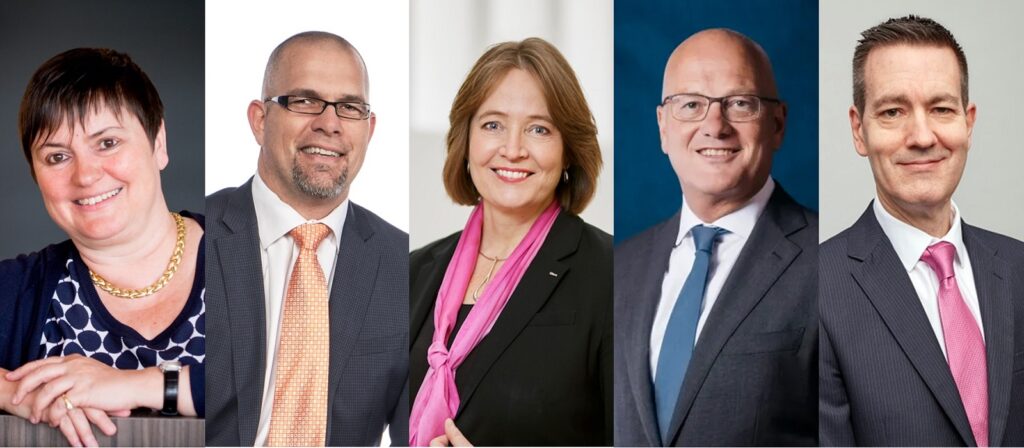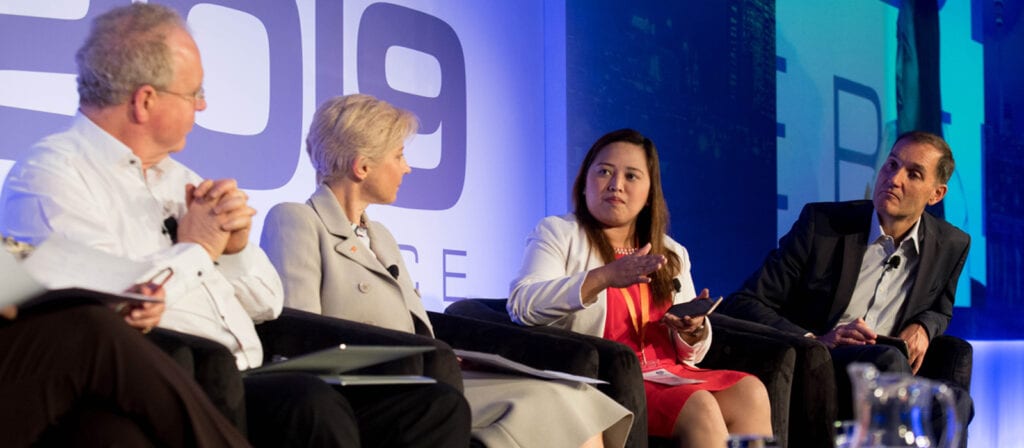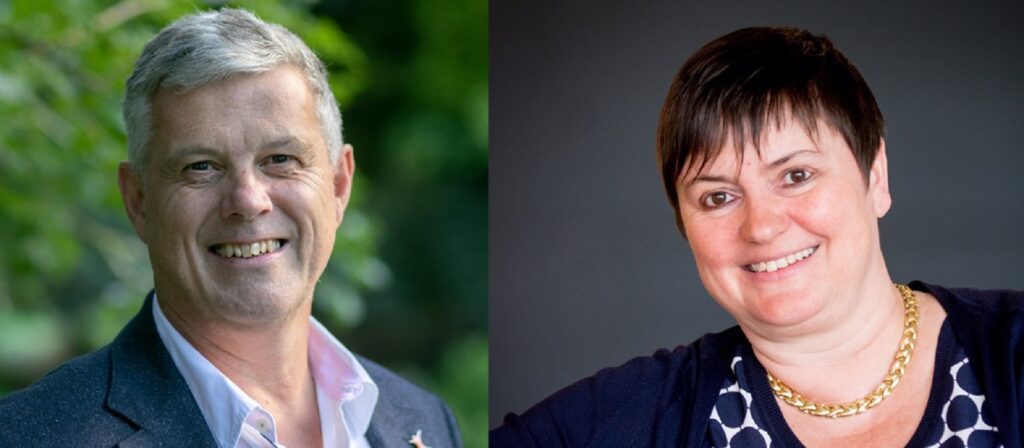ICMIF centenary fireside chat: Hilde Vernaillen, P&V (Belgium)
As ICMIF celebrated its 100-year anniversary on Monday 25 April 2022, Hilde Vernaillen, Chair of ICMIF and Group CEO of P&V Group, Belgium, joined ICMIF Chief Executive Shaun Tarbuck for an exclusive fireside chat.
P&V was one of ICMIF’s founding members and Shaun and Hilde reflect on the last 100 years of ICMIF and its members and a shared history of how the mutual and cooperative insurance sector has led the way in terms of financial performance and also being purpose-led.
The conversation also focuses on where we are today and, more importantly, the trends that are shaping the future of our industry and the powerful role that our sector too can play in redesigning insurance.
Click the following links for more information about the ICMIF Centenary and the ICMIF Centenary Conference (to be hosted in Rome, Italy, in October 2022).
Shaun Tarbuck:
Welcome, everybody, to the first in the series of Fireside Chats with our leaders. This is a new part of what ICMIF is going to be offering to leaders around the world, with our ICMIF members’ CEOs. Our very first one, appropriately, is going to be with Hilde Vernaillen, who is our current Chair and the CEO of P&V.
P&V was one of the founding members, and real leaders as well, in setting up ICMIF over a hundred years ago. So, it’s fitting that today, 25th of April, is the 100 year anniversary, to the date, of when we were founded in Rome. So, it’s very fitting that we have Hilde as our current Chair to do the first Fireside Chat, and kick that off.
Those of you that might not know, a little bit of history here. The very founding members were actually from Sweden, with Folksam and Samarbete, later to merge into Folksam. They were hosted by the Lega co-op, which then formed Unipol in the 1960s.
The Netherlands, which is now part of Achmea, was another founding member. Then, there was a French member which no longer exists. However, P&V and the CEO at the time, Joseph Lemaire, was definitely the driver behind the arrangement.
At that time, we were the insurance part of the International Cooperative Alliance. So, without Joseph Lemaire driving this forward for the first probably 50 years with himself and his brothers… and very much involving Folksam and the Cooperative Insurance also came into it early on as well, in the UK… I don’t think we’d have the network of connections that we have now.
Hilde, first question to you really is, how did you see the importance of this being set up? How has it played out in the history of P&V, and why has this been an important part of P&V for all those years?
Hilde Vernaillen:
Well, hi everybody. Thank you for having me on this first question, and bringing me back in history. Indeed, Joseph Lemaire, and his sons and brothers afterwards, found it very important to be in contact with organizations that were driven by the same goals. They were all purpose-led organizations, actually, trying to give protection to as much people as they could at that point of time.
Back in the beginning of the 20th century, the meaning was totally different as now. It was offering people a decent life, and that was the reason why they were founded. The reason why they founded ICMIF together is trying to learn from each other. This is something that the Lemaires have always done for P&V, is trying to learn from others somewhere else in the world.
Starting in Europe, but afterwards, also in the Americas and in Asia. Looking at similar organizations having the same purpose, how they were doing their business, and how we could learn from it and try to implement it in Belgium. This is what it was about.
Shaun Tarbuck:
Fabulous. Yeah. The reason for starting is still the reason we exist, which is often the case.
Hilde Vernaillen:
Indeed.
Shaun Tarbuck:
You were very involved, weren’t you, in the 100 years celebrations for P&V in 2007, I remember? Is there any advice you can give to ICMIF for our 100-year anniversary, and how we might celebrate it, both in terms of the year and the legacy?
Hilde Vernaillen:
Well, I think it’s first, celebration. I do remember we hosted ICMIF conference at that time as well. It was indeed a year of celebration through the whole year, with different events, and trying to show what we were, and show what is important for us. That was one of the reasons having ICMIF here at that point, because ICMIF is important, and that international network is important.
It’s about looking back, but also looking forward. It’s very important to look back, to understand who you are, but even more, to make sure you know what you want to be in the future, and what is the purpose of the organization for the future.
Shaun Tarbuck:
You also were very involved, weren’t you, in buying a major acquisition that particular year, and during the ICMIF conference, I seem to remember?
Hilde Vernaillen:
Indeed.
Shaun Tarbuck:
That’s worked out quite well, hasn’t it? We’re not proposing that ICMIF buys or merges, or if there’s anything like that, but you’d certainly marked it with a major acquisition, didn’t you?
Anyway, you’ve been ICMIF Chair, and a wonderful Chair, for the last five years. Can you reflect a little bit on your time as Chair, and maybe some of the key moments, and some of the highlights that you’ve had?
Hilde Vernaillen:
Well, it was a bizarre period. Too early, anyway, to make an overall assessment of those five years, because that will be for the conference in Rome, of course. But looking back, we started with a lot of traveling plans, and I remember our trip to Asia, visiting members in Japan, Korea, attending a conference of Japanese insurers, and so on.
Going to China, trying to set up insurance coops in China, which was really a tremendous experience. Then, traveling to the Americas, Argentina for the conference of ICMIF Americas there. And of course, and that’s an absolutely highlight, the conference in Oakland by the end of 2019. Then, we came into 2020, and because of the pandemic, we stopped all traveling.
We had a lot of plans. I remember, I planned to visit one region every year, but yes, it stopped there, but I tend to say that the value of ICMIF to the members, it increased as from then. If you look back at all the webinars, all the things we organized for members, the start of the knowledge hub, this is really of big, big value for the members.
I think we never had so much members involved as today. This is thanks to the great work ICMIF was doing at the secretariat. So, Thank you for that. That’s, for me, when looking back, I will remember that, all the value you created for the members during that difficult period.
Shaun Tarbuck:
Thank you. If I was to sum it up, it’s punctuated by major meetings, and actually meeting people face to face, which obviously we couldn’t do during that particular time. Yes, I think the China one was particularly interesting because out of that, mutuals were able to be set up in China.
And they still are. It hasn’t really taken off as much as we would hope, but at least we were at the beginning and we’ve enabled it. I think that’s the major thing. Looking at major statements and major events, we’ve got the ICMIF conference coming up in October. What do you think members could look forward to at this particular one?
Hilde Vernaillen:
Of course, it’s a celebration one. That is very important, but as always, it’ll be a very, very good conference on the content. Not going into the program that is online now, but if you look at it, it’s about purpose-led organizations.
It’s about how we can, as a mutual, as a coop, make the difference in the insurance world, but also in the world globally, and try to show the way. This is what ICMIF is about, and this is so important. You will find all of this in Rome, quite sure of that. As you said, it will be a first physical meeting in three years time, I think.
Three years time. So, it’s also gathering, it’s networking, but also gathering, find people again, which is a very important one at ICMIF as well.
Shaun Tarbuck:
Yes, we’ve had a lot of new members, and a lot of new existing members as well. So, I think it’ll be great to meet old and new faces.
Hilde Vernaillen:
There are a lot of people I only saw on the screen up to now.
Shaun Tarbuck:
Yeah. That true. Seems crazy. Doesn’t it?
Well, for those that might not remember too much about ICMIF’s history, for the first 70 years, the secretariat actually moved around different organizations that were members. So, P&V hosted to start with. We were based in Switzerland at some stage. We’ve been based in Canada and the US, depending on who had the presidency and the chairmanship, and then latterly in the UK.
But, we actually only had a physical secretariat since 1992. So, it’s actually 30 years exactly since we set up the secretariat. I’m not going to go into the history of what’s happened in those 30 years, but I think it was definitely the right move by the decision-makers at the time, which was the general meeting in Tokyo. What do you think ICMIF can look forward to for the next 30 years? That’s a big question. I know, but just spitball some ideas.
Hilde Vernaillen:
It’s indeed a big question. Actually, I do not know, but what I do know is that we will be able to adapt to the changing world, because this is what the ICMIF staff and ICMIF secretariat has always done, is make sure they were relevant at that point of time for their members.
Well, the last years, the last five years, but even before, we tried to make sure that there was enough agility in the organization to make sure we could change if needed. If I look now, the ICMIF secretariat is not the same today as five years ago when I started as a chair.
Hilde Vernaillen:So, we changed already. We changed the way of working. We changed the office, which I still haven’t seen. We changed a way of interaction with members. We changed a way of working together. So, we will be able to adapt in the future. Is it in the same framework as today?
I don’t know, but it doesn’t matter if we’re still to be connected with the members, we still adapt all the time on the changing environment. That’s really important. We also made sure that we could do that for the future. That was about financial stability. If you have to adapt to a changing world, you need to be strong from the inside as well.
One of the things, not the only thing for sure, one of the thing is the finance, which is quite okay now. And then, it’s all about the people, of course. So, it’s about leadership. It’s about the people of the organization, and we just have the right things in place for the future. So, quite confident.
Shaun Tarbuck:
So, just coming onto you as a member and P&V, you are very involved in many of the facets of what ICMIF does. Can you talk about the areas which have impacted you, and the impact they’ve actually had on P&V as a business. Have they helped?
Hilde Vernaillen:
I think we could find a lot of examples of things we did set up at P&V, learning from others, being in products and services, in the way of doing things. I do remember the setup of our first call center at P&V. We had a lot of chats with cooperators in Canada at that time, because they did it before.
We knew that. We’ve done that for a lot of areas, also in cyber-security, and so on. To me, it’s even more a way of thinking business, a way of looking at your business. For instance, inclusivity, which is very important in our strategy. It’s also important for a lot of ICMIF members in their strategy.
And sharing those things together, you tend to look at business differently, learning from others. I think that’s the most important thing. It’s also about micro-insurance, and sustainability in finance. There are a lot of examples, but it’s mainly the way of thinking.
Shaun Tarbuck:
Yeah, I agree with you. We do have time for questions at the end, if anyone else wants to put some questions in the Q&A box, so we’ll come back to that in a minute. Just lastly, looking at the challenges ahead for the whole insurance industry, what do you think we can just see? Because obviously, things have changed so quickly in our industry in the last 10, 15 years.
I’ve certainly seen it significantly and since I’ve been involved with ICMIF, but the pace is just gathering faster and faster. So, what do you think the main challenges are going to be again in the next 25 years? What role do you think the mutual sector generally will be able to play in that?
Hilde Vernaillen:
One of the main challenges, we certainly have the climate change, that’s obvious. We will have cyber risk as well, sustainability as all, and then climate change is linked of course. Instability in the world, and I think the war in Ukraine shows that today, but hopefully not more worse events like that in the future.
I think in this world where we have those big questions for future, the mutual and cooperative insurers can really show the way forward, and we do. When you look at what we’ve done with UNDRR on prevention, from protection to prevention, as a slogan. But it’s really more than that, because we showed the way with concrete ways of doing it.
We showed the way with sustainable investments. We showed the way in influencing on the global level, on climate change. So, as we did in the past… I think we were here to talk about history and look forward, but we started like that back in the 20th century-
In showing the way in a society that was moving forward, and that could have leave people along the way. What we do is make sure nobody stays along the way, be inclusive, and trying to bring real answers to the world’s problems, or issues, or big questions, as the climate change.
Shaun Tarbuck:
That’s very true, isn’t it? Many of our members will say that it’s in their DNA from when they were formed, to be helping others.
I think they give that societal benefit, for having access to insurance for when things go wrong, which is ultimately, that’s what insurance is, isn’t it?
I do think, as you say, the role that we will be playing going forward will be in those areas, and leading in those areas, hopefully. I have a question, actually, about inclusivity.
The question reads along the lines of, “Can you give some case examples of how P&V are living their inclusivity, and maybe some of the projects that you are undertaking today?” I understand how it was in 1907 when you first started in the labor movement, but now it’s quite a different world. Can you give us some case examples of those?
Hilde Vernaillen:
It’s a complete different world, indeed. Of course, I realize it can be very different depending on the market you’re acting on. What we try to do is offering, for instance, pension schemes collectively, which gives the opportunity to make sure everybody has access to it. Because, if you have to finance it individually, then it’s more difficult.
We have a principle in developing products, we call it inclusivity by design, and it starts with, make sure you don’t exclude anybody. It’s meaning, you try to find a balance between the main product you offer, but make sure in there, you also cover, for instance, very small houses along the river that are really at risk, and that a lot of insurers don’t want to cover.
Which we will find a way, in developing our global covers, that we also include those. It’s, for instance, make sure you are accessible for blind people or for deaf people. It’s because we all develop those digital tools, but if you can’t see-
It’s a problem.
So, all this kind of thing, it’s really trying to have inclusivity in everything we do. it’s not easy. It’s really not easy. Even from an insurer, technical point of view, because you could also attract all bad risks of the market, and then you’re bankrupt tomorrow.
This is, of course, not the purpose.
So, you need to make sure you have a well-balanced portfolio, but you don’t exclude anybody.
We are still looking to try to develop some micro-insurance in Belgium, because also in the developed countries, we still have people who don’t have access to any kind of insurance. It’s very difficult to set up, but we’re still trying. We’re still trying.
Shaun Tarbuck:
That’s interesting.
Hilde Vernaillen:
I know we will be there.
Shaun Tarbuck:
It’s very interesting you say there still are people who don’t have access to insurance. I think it’s not just a developing world challenge. It’s the developed world as well, isn’t it?
Yeah, that’s some inspiring examples there. Thank you. I have another question. What do you believe the value of ICMIF is, and where does it give you a competitive advantage?
Hilde Vernaillen:
As I said before, what ICMIF brings us is a way of looking at our business, and how to develop it for the future. I would say this is the competitive advantage. It’s also the network. It’s, if you have a question, just look at the ICMIF network, because for sure, somebody else had the same question, maybe a little bit before you, and you can come in contact with them.
You can also call the ICMIF staff, because they know a lot about what has been done by the other members. Well, it’s cheap consultancy. It’s much cheaper than any consultant. I won’t give you names, but we have a lot of strategic consultants outside there that are very, very expensive, and they give you an answer that they give to 50 others. So, it doesn’t give you any competitive advantage. They just make it mainstream.
What we do is asking others how they did it in other markets, and you learn from them, and you can implement that in your own market. It’s even better in the content, because it’s real, practical things. So, yes, much better and less expensive, good strategic consultancy.
Shaun Tarbuck:
What a great pitch there. I think, if we wrap it up with where we started on the history, I think Joseph Lemaire would be very proud, because if you read the minutes from the very first meeting, that’s what the aim was, was to share with each other, those five original members. It soon became 13, I think, a year later. So, it was a quite quick take up around the world. Around, well, Europe, it was at that stage. I think those all benefited from sharing those similar practices. It’s just, now, it’s much quicker and much easier to do. If you read the minutes from it, you didn’t have to worry about how you would get to places, because it could take you days-
You can just fly there, or do it this way, pick up the phone and just speak. So, thank you, Hilde. That’s a wonderful start for our kickoff meetings for our Fireside Chats. We will be doing more each month now as we run up to the conference, and then we hopefully we’ll be doing more after the conference as well, and continue this insight into how our leaders work and think. Thank you very much, Hilde. We’ll see you soon.
Hilde Vernaillen:
Thank you. Look forward to see all of you very soon. Bye bye.
Shaun Tarbuck:
Thank you.
The above text has been produced by machine transcription from the video recording. ICMIF has made every effort to ensure that transcriptions are as accurate as possible, however, in some cases some text may be incomplete or inaccurate due to inaudible passages or transcription errors. Listening to or watching the video recording will allow you to hear the full text as delivered during the video but this is available in English only. Our transcriptions are provided to enable members to select the language of their choosing using the dropdown menu above.





